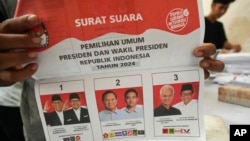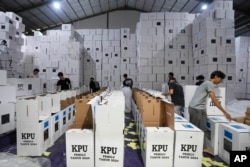Disputes in the South China Sea and how Indonesia should deal with China was a key focus at a nationally televised presidential debate earlier this week. Indonesians will elect a new president on February 14, and during the latest debate, the country's three candidates exchanged views on security, geopolitics and international relations.
When it comes to how they will deal with China, analysts tell VOA's Indonesian service that all three candidates' different experiences with Beijing are likely to have an impact on the way they handle bilateral relations, including disputes in the South China Sea.
"The various steps taken to resolve disputes in the South China Sea, including the Declaration on the Conduct of Parties in the South China Sea that led to the arrangement of a code of conduct document, have failed," said Ganjar Pranowo, candidate of the ruling Indonesian Democratic Party of Struggle.
Ganjar proposed three solutions: endorsing a temporary agreement with China, strengthening Indonesia's naval capacity and patrols, and starting the exploitation of gas reserves in the North Natuna Sea, which is between Indonesia and Vietnam and south of the South China Sea. He said Indonesia needs to prioritize developing its naval weaponry and resupplying naval ships patrolling the region.
"Allocating [a defense budget] of 1 to 2% of GDP, I believe, is a strong necessity," Ganjar said.
Similarly, third-time candidate Prabowo Subianto, a former special forces commander and current defense minister who has been leading in the polls, said disputes in the South China Sea underline the need for a strong defense force, platforms for patrols and additional satellites.
"We understand our country is very huge and rich; hundreds of years ago, countries from far away came to this archipelago to intervene and pit us against each other, to fight and to steal our wealth, until we became independent. And now we have to deal with our natural wealth being taken cheaply," Prabowo said.
Meanwhile, candidate Anies Baswedan, a former Jakarta governor, said that the Association of Southeast Asian Nations needs to play a bigger role in resolving disputes, including those in the South China Sea.
"Instead of acting as a single nation, we should stand together as ASEAN. We should deal with other countries as a unified region, and Indonesia must lead the way for ASEAN," he said.
According to Muhammad Zulfikar Rakhmat, a researcher on China-Indonesia-Middle Eastern studies at the Center of Economic and Law Studies, of the three candidates, Ganjar is likely to be more aligned with China.
During his term as governor of Central Java, Ganjar dealt with Chinese investment in manufacturing towns such as Tegal and Batang. China invested heavily to develop the Batang Integrated Industrial Zone, with investments valued at $1.5 billion.
Zulfikar added that Prabowo would also likely continue the current pro-China policies of President Joko Widodo.
Prabowo believes China's expansive maritime claim in the South China Sea is inconsistent with international law, and he wants to keep Indonesia as a nonaligned country amid the power struggle in the region between the U.S. and China.
As Indonesia's defense minister, Prabowo met with his Chinese counterpart on five occasions from 2019 to 2023 and sought to enhance bilateral ties in defense and security through the 2+2 Indonesia-China forum and the Defense Industry Cooperation Meeting in June 2023.
Meanwhile, Anies Baswedan, from his time as governor of Indonesia's capital, Jakarta, has stronger relations with Western countries than with China and had the fewest meetings with Chinese representatives, said Zulfikar.
Wahyu Dhyatmika, a senior journalist and chairman of the Indonesia Cyber Media Association, said that if Anies is elected as president, big development projects such as the plan to relocate and establish a new capital and plans to expand Indonesia's high-speed railway will be reevaluated.
"Chinese government projects will be under threat of further scrutiny," he said.
While Indonesia is not a territorial claimant in the South China Sea, its exclusive economic zone around the Natuna Islands overlaps with Beijing's territorial claims. Bilateral diplomatic tensions have grown in recent years as Chinese naval patrols have been more aggressive and encroached into Indonesia's exclusive economic zone.
At a news conference in Manila, ahead of a visit by Indonesia's current president, Foreign Minister Retno Marsudi said Tuesday that Indonesia is ready to work with ASEAN, to finalize a long-delayed code of conduct for the South China Sea, where many of its neighbors have overlapping claims with China.






